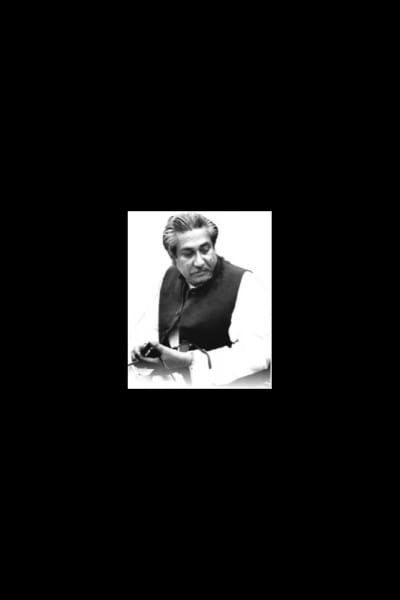His life, struggle

Bangabandhu Sheikh Mujibur Rahman was born on 17 March 1920 to Sheikh Lutfur Rahman and Shahara Khatun in village Tungipara under the then Gopalganj subdivision. Affectionately called Khoka by his parents, he began his school education at Gimadanga Primary School. He then moved on to Gopalganj Public School before being transferred to a missionary school. However, in 1934, he had a break of studies, which lasted four years, owing to an operation on one of his eyes.
Having completed his studies from Islamia College in Calcutta in 1947, Bangabandhu took admission in law at Dhaka University. However, his active involvement in politics led to his expulsion from the university in 1948. It was also the year in which he went to jail, twice. That was but the beginning of a political career that would lead to innumerable spells in incarceration for the future founder of Bangladesh.
By 1954, Sheikh Mujibur Rahman had transformed himself into an activist politician thanks to his involvement in the formation of the Awami Muslim League in June 1949. At the provincial elections of March 1954, the Awami League played a pioneering role in the creation of the Jukto Front, which convincingly defeated the ruling Muslim League by winning 223 seats out of a total of 237. The AL alone won 143 seats. Mujib won his seat from Gopalganj and joined Sher-e-Bangla's cabinet as minister for agriculture and forests. The new ministry was, however, dismissed under Section 92-A by the Pakistan central government at the end of May. Mujib was arrested at Dhaka airport on his return from Karachi. He was to remain in prison till December of the year.
In 1955, Bangabandhu was elected member of the Pakistan constituent assembly. On 25 August, as moves got underway to establish One Unit in West Pakistan and change the name of East Bengal to East Pakistan, he demanded a referendum or plebiscite on the issue. It was also the year when his party shed the term 'Muslim' from its name and became the Awami League. By 1956, Mujib was a minister in the provincial government of Ataur Rahman Khan. In May of the following year, however, he resigned in order to focus on the organizational activities of the Awami League.
Following the imposition of martial law throughout Pakistan on 7 October 1958, Bangabandhu was arrested on 11 October and implicated in one case after another. Released after fourteen months, he was re-arrested at the jail gate. He was freed in 1961 after he had filed a writ petition before the East Pakistan High Court. On 6 February 1962, he was arrested again but released on 2 June. He travelled to Lahore in September and assisted his leader Huseyn Shaheed Suhrawardy in the formation of the National Democratic Front, an alliance of political parties opposed to the Ayub Khan regime.
Following Suhrawardy's death in Beirut on 5 December 1963, Sheikh Mujib revived the Awami League in January 1964. It was a move which clearly demonstrated his desire to mould the party along the lines he thought would turn it into a voice of the Bengali masses. He campaigned all over East Pakistan to drum up support for Miss Fatima Jinnah at the upcoming presidential election. He was arrested by the regime fourteen days before the election but later freed by order of the High Court.
In February 1966, Mujib announced the Six Point programme of regional autonomy at a conference of Pakistan's opposition parties in Lahore. In May, he was arrested under the Defence of Pakistan Rules. While in prison, he was charged, in January 1968, with conspiracy to break up Pakistan through what was given out as the Agartala conspiracy case. A mass upsurge forced the withdrawal of the case on 22 February 1969. The next day, at a huge rally at the Race Course, Mujib was officially honoured by a grateful Bengali nation as Bangabandhu --- Friend of Bengal.
Bangabandhu led the Awami League to a decisive victory at Pakistan's first general elections in December 1970. However, as the Yahya Khan regime and Zulfikar Ali Bhutto began to conspire against the Awami League to deny it the right to form a government at the centre, Bangabandhu went before the country on 7 March 1971 and delivered what clearly was the finest speech of his career. He called the struggle one of emancipation and independence.
As the Pakistan army launched its genocide on 25 March 1971, Bangabandhu declared Bangladesh's independence early on 26 March. He was arrested soon afterward by the army and flown to West Pakistan, to be put on trial on charges of treason. After a trial in camera, he was sentenced to death by a military tribunal in early December 1971. Pakistan's defeat in Bangladesh and the emergence of the Bengali nation saw him return home a hero, the father of his people, on 10 January 1972.
Bangabandhu took charge of free Bangladesh as prime minister on 12 January 1972. The Jatiyo Sangsad adopted a constitution for the country in December 1972. In early 1975, Bangabandhu went for a change in the system of government, became president of the country and declared a Second Revolution.
In the pre-dawn hours of 15 August 1975, Bangabandhu Sheikh Mujibur Rahman was assassinated, along with most of his family, in a bloody coup that was to take Bangladesh back to medieval darkness.

 For all latest news, follow The Daily Star's Google News channel.
For all latest news, follow The Daily Star's Google News channel. 



Comments